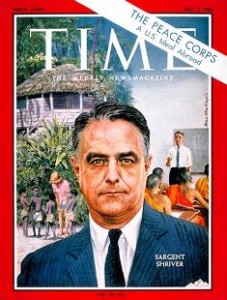Is The Peace Corps A Waste Of Time (And Money)?
There is a new book out from Angus Deaton, the Eisenhower Professor of Economics and International Affairs at Princeton, entitled The Great Escape: Health, Wealth and the Origins of Inequality published by Princeton University Press. Before Deaton got to Princeton, he was with the World Bank, and with the Gallop Organization creating survey-based measures of well-being.
In his book, Deaton states that global poverty today is no longer a result of lack of resources or opportunity, but of poor institutions, poor government and toxic politics. He blames both the giver and the receiver for this! He cites as an example Mauritania that several years ago was in danger of losing its international aid. So, the country’s president hatched the idea of becoming one of the few Arab countries to recognize Israel. The aid taps, Deaton said, were turned back on and the money flowed to Mauritania.
Deaton goes onto say that “no credible evidence that foreign aid promotes economic growth: indeed, he says, signs show that the relationship is negative. He makes this telling point–“when the conditions for development are present, aid is not required. When they do not exist, aid is not useful and probably damaging.”
Now, what does AID has to do with the Peace Corps?
Absolutely nothing. The Peace Corps is not in the foreign aid game. The Peace Corps is doing something else. It is a trigger for development.
As Leo Cecchini (Ethiopia 1962-64) pointed out yesterday in a comment he posted on this site: “The real value of the Peace Corps is the close cross-cultural relations that are its lasting gift to the world. This is not an exercise in how many latrines one builds, but how many Americans get a better understanding of other peoples and how many of our hosts gain a better understanding of Americans.”
Shriver repeatedly stated from the first days of the agency what the real value of Volunteers was  overseas. In an article written for Foreign Affairs in July, 1963, he makes the point that the Peace Corps’ contribution has been less in direct economic development than in social development–health, education, construction, and community organization. “We are convinced,” Shriver wrote, “that economic development directly depends on social development.”
overseas. In an article written for Foreign Affairs in July, 1963, he makes the point that the Peace Corps’ contribution has been less in direct economic development than in social development–health, education, construction, and community organization. “We are convinced,” Shriver wrote, “that economic development directly depends on social development.”
He goes onto say, “The Peace Corps is not a ‘foreign aid’ agency. Two of the three purposes of the Peace Corps as defined in the Act deal with understanding, not economic assistance. Moreover, our financial investment is in the Volunteer, who brings his skills and knowledge home with him. Seventy-five percent of the Peace Corps’ appropriated funds enters the economy of the United States; of the remaining 25 percent, more than half (57 percent) is spent on American citizens, the Peace Corps volunteers themselves.”
So, when you see books like The Great Escape by Angus Deaton and read all his dire words about foreign aid just keep on walking by, it ain’t about us.
John, Thanks for flagging (and flogging Deaton’s book) and for your analysis and reminder of what the Peace Corps set out to be. –Tino
If Angus Deaton sees toxic politics as a major cause of the economic malaise of developing countries, then he must agree that Republicans in general and the so-called Tea Party in particular are busy undeveloping the United States. He sounds as ignorant as they and is probably a pretty successful undeveloper himself.
“Underdeveloping,” my, my I do admire the flexibility of the English language or should I say “American” language?
It was President Eisenhower that called the Peace Corps idea ” Kiddie Corps” at a speech at the annual Al Smith Annual Dinner .